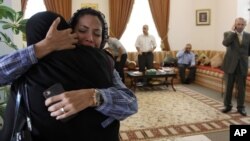MANAMA, Bahrain - A Bahraini appeals court on Thursday reduced the prison sentences of nine medics convicted for their role in last year’s anti-government uprising while acquitting nine others, in a case that has been heavily criticized by rights groups.
A military court in September sentenced 20 health professionals to between five and 15 years in prison. The revised sentences range from one month to five years.
Two medics convicted last year did not appeal and are believed to have fled the country.
Bahrain's government says the charges brought against the health workers were primarily for politicizing their profession, breaching medical ethics and for attempting to overthrow the monarchy.
Authorities stress the group was not punished for treating injured protesters.
The medics are all Shi’ite Muslims who were originally accused of possessing arms and occupying the Salmaniya Medical Complex. They say they were tortured into giving false confessions last year and insist they are innocent.
None was in court Thursday to hear the verdicts being announced; instead they convened at the home of one of the doctors.
Dr. Fatima Haji was declared innocent after originally being sentenced to five years in prison. She expressed disappointment at the guilty verdicts that were upheld. "Some of them will go back behind bars for five years, which is absolutely unfair because we all did the same thing. We were exactly in the same place, we were in the same rooms in the hospital, we did the same thing: treating people who were in need," she said.
Dr. Ghassam Dhaif, whose wife was acquitted, had his 15-year sentence reduced to one year, but says no reason for the reduction was given. "It shows you how inconsistent these courts are and how much they are politicized. There is no comparison between 15 [years] and one year, and even with this one year it’s illogical and it’s baseless," he said.
The medics say they were prohibited from using some witnesses in their defense and were also unable to raise their complaint of torture in custody.
Ibrahim al Demestani, who says he was severely abused by security officials, was given one of the longest revised prison terms - three years.
"If I’m going to jail for this case, really I am glad to be there because we did humanitarian [work] and we want to expose this government to the international [community] that this is the level of our government," he said.
The Bahrain Independent Commission of Inquiry report published in November said some medics had moved in and out of their roles as political activists and medical personnel. It also said some Sunni patients were turned away from the hospital by Shi’ite staff.
Abdul-Aziz al-Khalifa of the Bahrain Information Affairs Authority criticized the overwhelming support given to the medics by the international media.
"It’s unfortunate that just because they’re doctors and nurses, people think of them as having a very squeaky clean image. Some of them quite openly called for the downfall of the regime and it’s basically a coup d’état being organized by doctors," he said.
Bahrain’s majority Shi’ites, who say they are treated like second-class citizens by the ruling Sunni minority, led last year’s anti-government uprising, which was eventually quelled by the government with help from neighboring Saudi Arabia and the United Arab Emirates.
Despite some apparent attempts at reconciliation, sectarianism continues to divide the country. Brian Dooley of Human Rights First says the medics’ trial is a missed opportunity to forge reconciliation. "It’s very difficult to see a way to real reform and real reconciliation if some of these doctors are going to be found guilty," he said.
The nine convicted medical workers say they will make a final appeal to Bahrain’s highest court, the Court of Cassation.
Twenty-eight additional medics are on trial for smaller charges and are expected to be in court next month.




